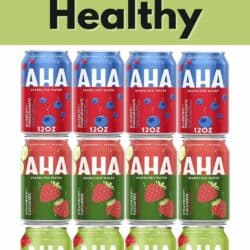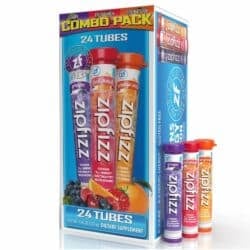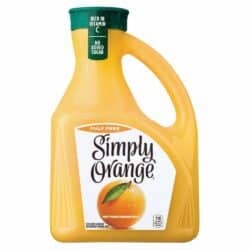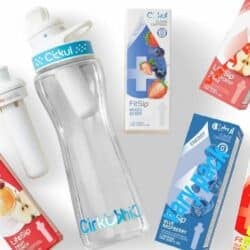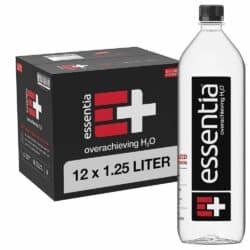Is AHA Sparkling Water Healthy (Nutrition Pros and Cons)?
In this blog post, I’ll review the question of whether AHA Sparkling Water is healthy or not? Find out what this product’s nutrition pros and cons are, plus some better options to consider. For most people, AHA Water is reasonably healthy in moderation.
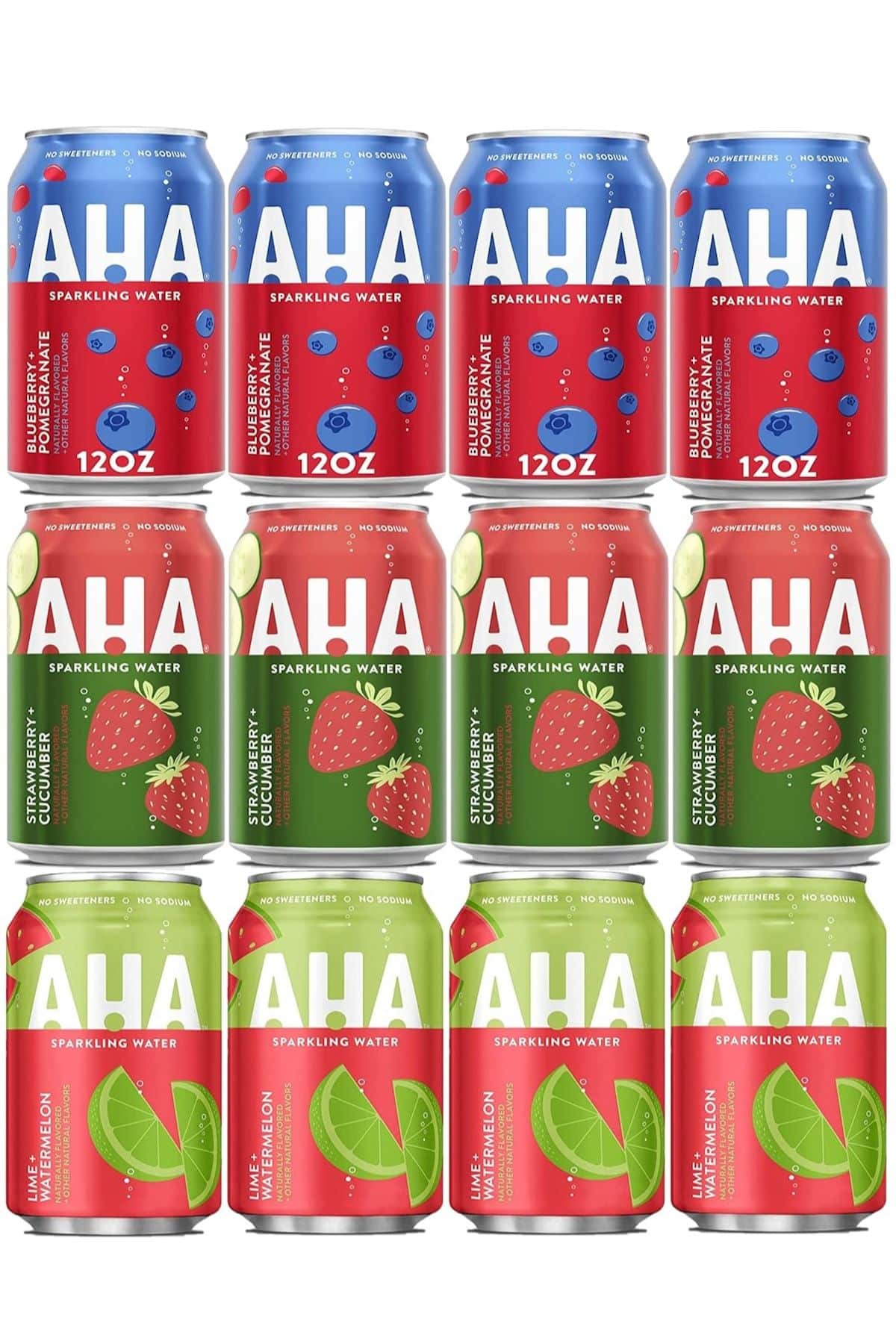
AHA Sparkling Water Facts
AHA is a sparkling water product from the Coca-Cola company.
The company created it as a unique sparkling beverage with zero added sugar and calories aimed at health-conscious people. It is sugar-free, gluten-free, and free from artificial flavors or colors.
AHA Sparkling Water is available in a range of flavor pairings to appeal to your taste buds:
- Blackberry & Lemon
- Lime & Watermelon
- Peach & Honey
- Orange & Grapefruit
- Blueberry & Pomegranate
- Pineapple & Passionfruit
These AHA flavor combinations contain minimal ingredients: only carbonated water and natural flavors.
AHA Sparkling Water Ingredients
As mentioned above, AHA Sparkling Water contains two ingredients: carbonated water and natural flavors.
Let’s explore these two ingredients in a little more detail so you can consider how they may affect your health.
Carbonated water
Carbonated water itself is typically considered safe and healthy for most people. It does not contain calories, sugar, or artificial additives. It’s an excellent choice for most people for staying hydrated.
Also known as soda water, sparkling water, or fizzy water, carbonated water is simply water that has been carbonated, typically by dissolving carbon dioxide (CO2) gas under pressure. This fizzy beverage with no added sugars is more exciting to many people over regular water.
This simple beverage is considered safe and healthy for most people as long as the water source has been filtered and purified.
However, it is essential to note that in some cases, carbonated water can cause digestive problems, for example, bloating, discomfort, and gas, especially when consumed quickly.
People with stomach conditions like IBS or acid reflux may also find carbonated water worsens their symptoms.
Natural flavors
There is a regulatory conflict in food labeling regarding “natural flavors” because there is no clear definition of what “natural” constitutes.
Because of this conflict, manufacturers are free to describe a vast array of ingredients as natural, even when some elements or the processes used to manufacture them can be considered unhealthy.
The nutrition label on AHA Sparkling Water does not specify the exact source of its natural flavors or the extraction process used to create these flavors.
It means that there is a chance that the manufacturer extracted the natural flavors using synthetic and unhealthy products and processes. For example, enzyme-assisted extraction involves using solvents and other harmful elements with high heat to extract flavors from fruits.
The solvents, preservatives, and artificial emulsifiers used in this process are called “incidental additives”; manufacturers don’t have to disclose them. It’s also important to note that since there is no official definition of what “natural” means, genetically engineered crops can also be classified as natural.
Additionally, some “natural flavors” contain common allergens like sesame, and manufacturers are not required to disclose this either.
Food companies are only obligated to list whether food ingredients contain major allergens. Even if flavors contain allergens, they may not be listed on the label. It means that somebody who is sensitive or allergic to a particular ingredient used in the processing or as part of the flavor may have an allergic reaction.
Nutrition Pros
Overall, AHA Sparkling Water’s ingredients are relatively clean. These products don’t contain sugar, artificial sweeteners, sodium, or other processed ingredients.
AHA Sparkling Water is likely healthier than other drinks containing artificial sweeteners, added sugar, and other ingredients. They offer a better option for people who enjoy convenient drinks to hydrate.
AHA promises to offer a unique flavored sparkling water experience. This can be appealing to people who are trying to consume fewer calories from sports drinks or soft drinks.
The different flavors can offer interest over plain water and the good news is that this product will not contribute to weight gain like sugary sodas or even diet soda can.
Nutrition Cons
While AHA Sparkling Water drinks may not contain any obviously harmful or dangerous ingredients, there are two nutritional concerns you should be aware of before deciding to add these drinks to your regular diet.
It comes in aluminum cans
AHA Sparkling Water drinks are manufactured in aluminum containers, which can react with acidic and alkaline foods. Since carbonated water has a pH of around 4.5, it is not a major concern with this product.
However, if some of the natural flavors contain citric acid, the pH could become more acidic and cause damage to your teeth or tooth enamel over time.
Research has revealed a link between aluminum and Alzheimer’s Disease and other cognitive problems, even if the aluminum is ingested in small quantities.
Another downside to aluminum is its environmental impact, including greenhouse gas emissions and energy consumption. Not all aluminum containers are recyclable, and even if they are, recycling takes energy.
There’s also a cost implication. Aluminum is expensive, especially aluminum coated with a protective layer. Whether AHA Sparkling Water is manufactured in coated or uncoated aluminum cans is unclear.
“Natural” flavors
Since there is no official definition of natural flavors, it’s impossible to know whether the natural flavors used in AHA Sparkling Water to provide the water flavors are truly healthy ingredients.
Some “natural” flavors are produced using unnatural methods like enzyme-assisted extraction, which uses solvents at high heat. This creates a risk of contamination.
AHA Water FAQs
Carbonated water and natural flavors. It’s unclear how the “natural flavors” are extracted, so there may be some contamination, but the ingredients and detailed processes are not specified, so it’s impossible to tell.
No, AHA Sparkling Water drinks are zero-calorie and zero-sugar drinks.
Yes, AHA Sparkling Water is considered to be healthier than sugary sodas or drinks. However, natural water flavored with a few drops of 100% natural, organic fruit juice or infused with fruit slices is an even better choice.
No. Although AHA Sparkling Water may previously have offered a caffeinated range with low quantities of caffeine in the drinks, it is not currently available on their website or other regular supplier’s websites.
No. AHA Sparkling Water does not contain any artificial sweeteners or preservatives.
Conclusions
AHA Sparkling Water is not sweetened with unhealthy artificial sweeteners and contains no artificial flavors or colors. It is a minimally processed product with only two ingredients, and both are relatively natural and clean. It’s a convenient way to hydrate, and some people find these drinks tasty and refreshing.
However, products with carbonated water may not be suitable for people with gastrointestinal disorders like IBS or acid reflux, and there is controversy in the health industry about “natural flavors.” Some health-conscious people will avoid products containing them.
For a suitable and refreshing alternative drink, make 100% clean fruit-infused water at home by adding fruit slices to carbonated or still mineral water and cooling it.
Don’t Miss These Product Reviews
Don’t forget to join my newsletter list to get exclusive clean eating recipes and tips. The newsletter is 100% free with no spam; unsubscribe anytime.
About the Author: Carrie Forrest has a master’s degree in public health with a specialty in nutrition and is a certified holistic nutritionist. She is a top wellness and food blogger with over 5 million annual visitors to her site. Carrie has an incredible story of recovery from chronic illness and is passionate about helping other women transform their health. Send her a message through her contact form.
Note: this post is for informational purposes only and is not intended as medical advice. Please consult your healthcare provider for recommendations related to your individual situation.


